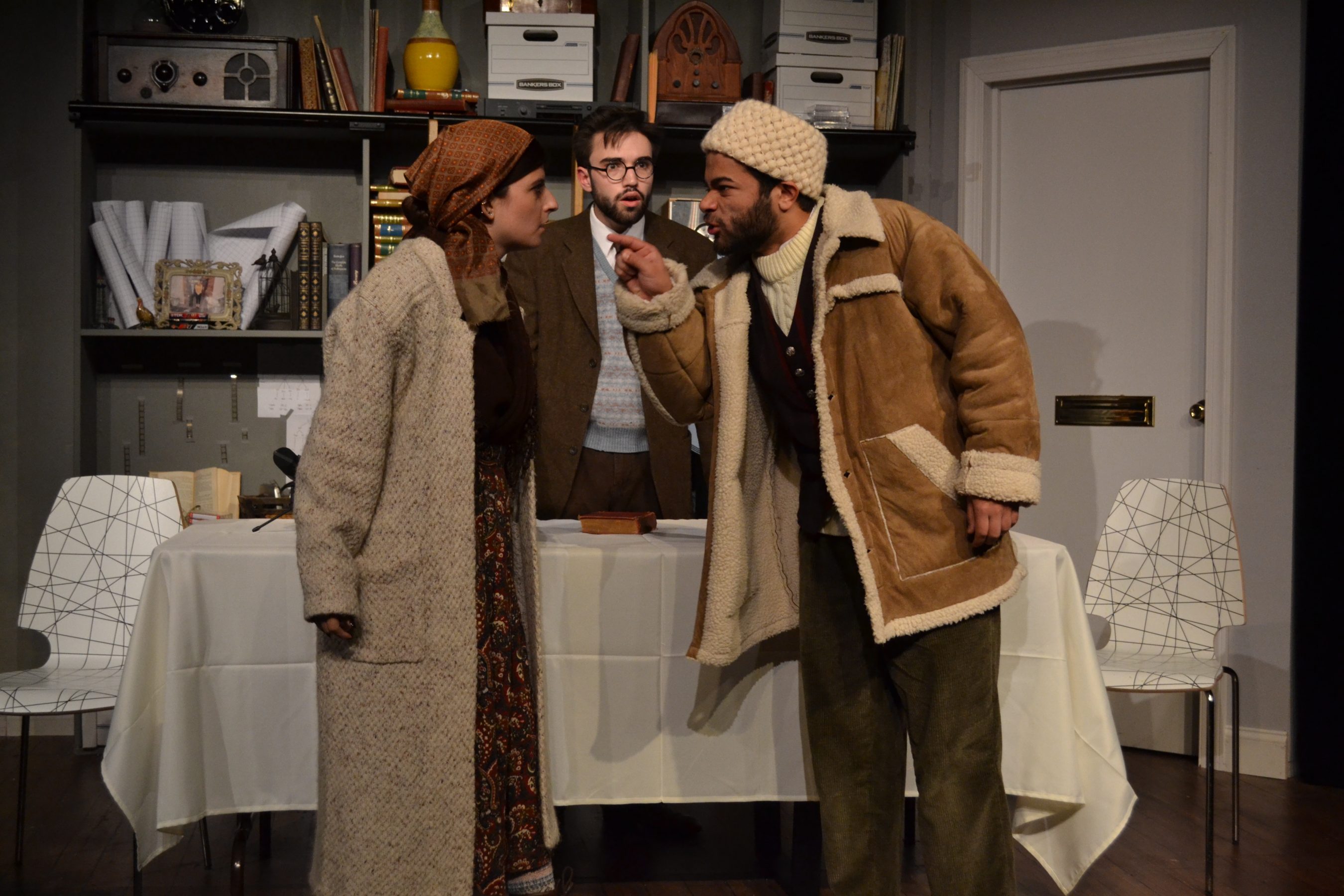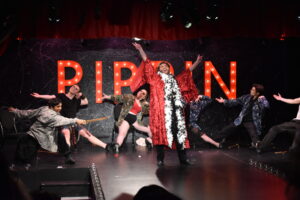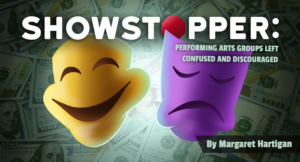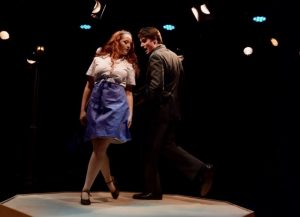The voices of all the students involved in the making of The Language Archive, from the actors and costume designers to the producers and light directors, weave together and emanate throughout the theater, each one speaking the words “I love you” in a different dying language. The tape, constructed by the play’s sound designer, Shane Quinn (COL ’19), expresses the words that the characters cannot. Georgetown University’s Nomadic Theatre tackles the challenges surrounding honesty and letting go in their rendition of Julia Cho’s The Language Archive, with showings Friday, Oct. 26 and Saturday, Oct. 27 in the Village C Theater. The show cleverly entertains while simultaneously imparting the value of language in maintaining relationships.
“The Language Archive is a play about language, loneliness, love. The way that we talk to one another, the way that we are there for one another,” said Matthew Phillips (COL ’22), who plays the main character, a linguist named George.
George has devoted his life to preventing the disappearance of dying languages, while letting his personal life turn to disarray. His marriage with Mary (Ashanee Kottage, SFS ’22) is disintegrating before him. He remains oblivious to his doting assistant Emma’s (Madison Carter, COL ’21) love for him. And despite putting his soul into his linguistic endeavors, his work life is at a standstill.
His latest project is documenting a disappearing tongue through the study of a married couple, the last living speakers of the language. Before George can proceed, he has to intervene in the couple’s quarrels because when they are angry at each other they exclusively speak in English, reserving their native language for words of love. They explain that the English language is best suited for expressing anger, as American culture is inherently resentful to them. Allison Lane (COL ’19) and Divij Mullick (MSB ’22), who play the couple, Alta and Resten, skillfully transition between moments of vicious arguments to the characters’ underlying love for one another.
The visuals of the performance tell a story in themselves. In the first act, the stage is divided between George’s home and his lab, where he records the dying languages. The setup blends his two worlds together and reflects his difficulty in separating his work from the rest of his life. After intermission, George’s home is replaced by Mary’s bakery, where she works after leaving him, a physical manifestation of George’s loss of home on stage.
While Alta and Resten save their own language for words of love, George cannot express his own feelings of love with Mary in their shared tongue. Even though George speaks many real languages, he can only say “I love you” to her in a fictional one. It’s as if his love for her no longer inhabits the real world, but rather an imagined one that persists only because of the longevity and comfort of their relationship.
A play about fabricated married couples may feel far from the Georgetown undergraduate experience, but many of its topics speak to the everyday human reality that all people share.
“I think George is kind of ubiquitous; he’s kind of every man. We all struggle to communicate, George just happens to do it in very specific, big, theatricalized ways. But he’s a very well-intentioned man who sometimes struggles,” said Phillips.
George desperately wants to save dying languages because he believes that when a language disappears, the culture it belongs to does as well. He views his marriage in a similar way, believing that if he can only tell Mary he loves her, he will save their relationship. Alta, meanwhile, argues that culture is what creates language: If a language is dying, the culture has long been dying, too. In her view, George and Mary’s marriage broke first, and their ability to communicate deteriorated after.
“The idea of unrequited love or trying to hold onto a relationship that just isn’t working really can apply to college students. At Georgetown, there’s just so much pressure to do everything right, be the ideal Georgetown student,” said producer Cristin Crowley (MSB ’20). “We all do so much, and we all try to be so perfect at this school. And that’s what these characters are trying to do.”
Awkward moments are scattered throughout the show, reflecting our own uncomfortable experiences. However they serve to make its difficult themes more relatable, rather than dilute them. In the beginning, George keeps finding little notes from his wife detailing her doubts about their marriage—hidden between the pages of his book, inside his shirt pocket, and even at the bottom of his tea. Mary refuses to own up to them when confronted because saying them out loud is too painful.
Although the situation is serious, it’s restorative to laugh because we recognize our own reluctance to confront others. Maybe not everyone would go to Mary’s extremes to avoid confrontation with her husband, but we all struggle to be open and find the right words.
During a highpoint of the play, George witnesses Alta and Resten curse each other out of existence, and then refuse to acknowledge one another. He’s frustrated, wondering how they could be stubborn enough to let their language die with their love. Alta unfolds one of the main takeaways of the play in response: They’ve long known that their language would not survive, and sometimes holding on just brings more pain. Letting go is hard, but sometimes, it’s for the best.





